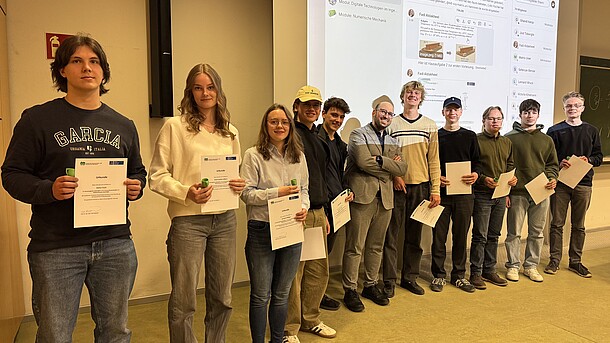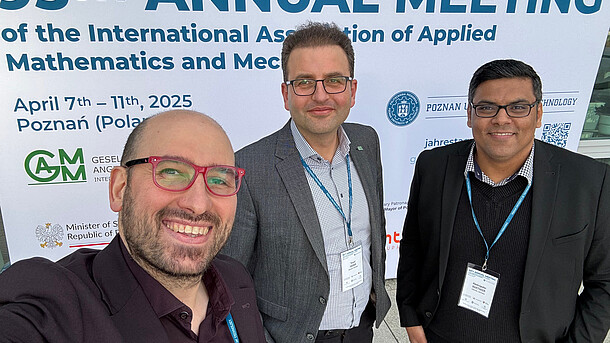Welcome to the pages of the Institute of Mechanics and Computational Mechanics (IBNM). The IBNM team is engaged in academic training within the Bachelor and Master programmes in civil engineering studies, and in doctoral education.
Our research activities focus on the physical and mathematical modelling, and the development of related robust and efficient computational algorithms for processes in continuum mechanics.
Relevance of mechanics for sustainability
We develop numerical simulation methods for the analysis and optimisation of processes in nature and technology. These methods are applied in various fields and thus contribute to the development of sustainable products and processes. Some examples are:
-
Material Fatigue
![Polariskop- und Betonmodell zur Überprüfung des Spannungszustandes einer Wandscheibe]()
![Polariskop- und Betonmodell zur Überprüfung des Spannungszustandes einer Wandscheibe]()
![Polariskop- und Betonmodell zur Überprüfung des Spannungszustandes einer Wandscheibe]() ©
IBNM 2022
©
IBNM 2022
It is well known that civil engineering structures are subject to material fatigue due to multiphysical external effects. With very detailed physical models and suitable model reduction methods, we develop simulation procedures with which the material fatigue can be predicted already in the design phase. These simulations can also accompany the life cycle of the structures and support maintenance and repair measures. In this way, they can help to reduce the enormous and energy-intensive use of materials for a new building.
-
Tyre Mechanics
![Simulation eines rollenden Reifens auf rauem Untergrund]()
![Simulation eines rollenden Reifens auf rauem Untergrund]()
![Simulation eines rollenden Reifens auf rauem Untergrund]() ©
IBNM 2022
©
IBNM 2022
A long-standing research topic at the institute is the development of simulation methods for the dynamics of rolling tyres. Such methods can be used to explain physical processes that can hardly be determined by technical measurements. This provides industry with methods to design their products more sustainably, e.g. with regard to the aspects of particle abrasion, environmental noise, energy consumption, etc.
-
Bone Mechanics
![Röntgenbild und Finite-Elemente-Modell sowie die daraus resultierende Änderung der Dichte eines Hüftknochens mit Prothese]()
![Röntgenbild und Finite-Elemente-Modell sowie die daraus resultierende Änderung der Dichte eines Hüftknochens mit Prothese]()
![Röntgenbild und Finite-Elemente-Modell sowie die daraus resultierende Änderung der Dichte eines Hüftknochens mit Prothese]() ©
IBNM 2022
©
IBNM 2022
Also, biomechanics of bones has been a research area at the institute for a long time. Among other things, we focus on the longevity of joint implants. This enables us to support physicians in providing patients optimal care with implants that are as long-lasting as possible.


















